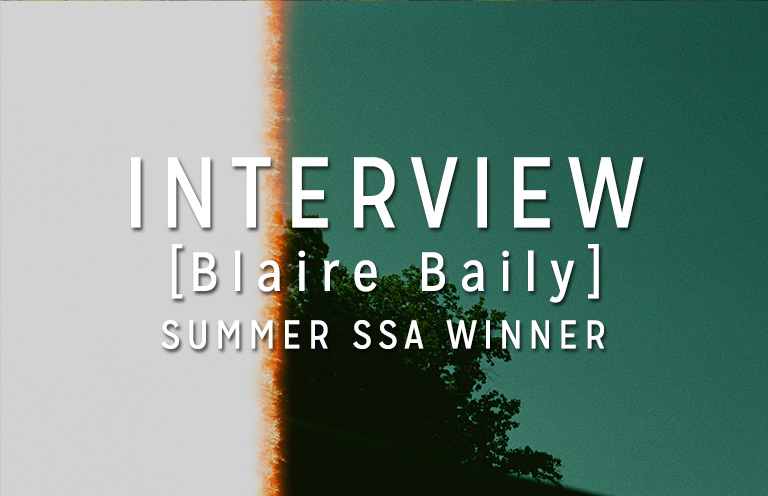Blaire Baily’s “Coup de Grâce” placed second in our Summer Short Short Story contest. Here, she talks about the object at the center of the drama, the way she handled the heavy emotions of the story, and what’s next for her.

One of the things I really like about this story is the use of an object—the Toko—to ground us. Can you talk about the Toko’s evolution in the story? Was it always as important as it is in this draft or did it start out as one thing and become another?
Originally, there was no Toko in the story and, unsurprisingly, the draft did not work. Initially, Morgan’s photographs of Grace reproduced only how Grace was willing to act in front of a camera. Most abusers carefully control how they appear to others. Outsiders, friends and family, are often shocked by video or photographic evidence of what abusers—who appear caring, rational, and calm—have done behind closed doors. And because denial and gaslighting are common, survivors come to doubt their version of reality and their own experiences. Words, when someone knows how to wield them, can be very disorienting. Photographs, because they are non-verbal, because they reflect material reality, can bypass that distortion. Morgan needed a reality check and she found it, and I found it, in the Toko. Once I realized what role the Toko played in the story, it became central.
There’s a lot of tension built into this story in the interplay of opposites—light and shadow, stillness and motion. Can you talk a little about how you think these opposites work in this story?
Opposites are a form of visual and conceptual clarity. Often we reject opposites as over-simplifications. Abusers are good at manipulating survivors into thinking that abusive behavior is not abuse: It is instead a nuanced, complex phenomenon that occupies a grey area, so that even the question “is this abuse?” becomes very difficult to answer. But some things are black and white. Opposites, with their clear and concrete contrasts, offer a powerful conceptual antidote. In a story in which Morgan seeks, above all, clarity, the opposites exemplify difference and distinction. They also mirror how Morgan herself must choose between two very different visions for her own life. The more she can exaggerate the difference, the easier the choice.
There are a few moments of life and death in this story—the accidents Laylene always stops for, the pigeon. How are those moments important to the overall feel of the story?
I think the presence of death colors the narrative with the threat of impending violence and portrays the intensity what is at stake psychologically. If Morgan chooses to sit on the sideline of her own life, if she makes no move to save herself, she will experience a kind of psychological death—a death of the spirit. Morgan has already lost part of herself, has become someone willing to photograph her partner secretly, someone who is at risk of losing her empathy. There is also the looming threat of escalating physical violence. To me, Grace, like many abusers, has been poisoned from within, and now is turning that poison outward. The threat of death, in one form or another, is very real.
This seems like it must have been an emotionally difficult story to write. Can you talk a little about your process in writing it? Was it done is one great burst or did you have to take breaks and come back to it again and again?
Early drafts of the story centered on scenes of Grace’s tirades, of her explosive anger. I had to write one scene at a time, on separate days, because they were so highly charged. It’s a lot of vitriol, a lot of victim-blaming and manipulation. Toxic territory. I refocused the story on moments between explosions, when Morgan struggles to process what has happened, to reckon with reality, and to find clarity. And the more I wrote, the more I dove into Morgan’s interiority and character, and the evolution of her understanding of their relationship, the easier the writing became. As the draft evolved, I decided that Morgan had started to photograph Grace. That allowed me to write about Morgan’s agency and not just her reactivity, and that was heartening. Because I did the hard work of capturing the rocky emotional landscape early on, I was free to concentrate, in revisions, on other aspects of craft. That later writing felt less psychologically charged. Ultimately, writing the story was empowering even if, day to day, the toxic dynamic and dark emotion was tough to handle.
What’s next for you? Are you working on other stories?
Right now, I am working on a collection, tentatively titled Safe House, about life in an emergency domestic violence shelter—the facility, the clients, the staff. It’s a unique environment that tests the strength and determination of everyone involved. Shelters are small, determined communities working against a much larger problem. The microcosm of a shelter reveals larger systemic issues. Because of my background as an attorney and my work as a Legal Advocate, the collection focuses especially on survivors’ interaction with the justice system. Partly, I hope these stories will start a conversation. Despite increasingly “survivor-centered” laws, the shelters are full and meritorious restraining orders are routinely denied. Too often, survivors end up defending themselves in children’s court. Too often, judges order visitation for an abuser who will show up at a custody exchange only to harm the mother of his children. These are stories of courage, humor, and resiliency. I feel that now, just as the country is rolling back women’s rights, is the time for these stories.
Interviewed by Jen Dupree
